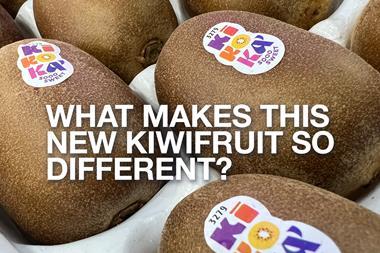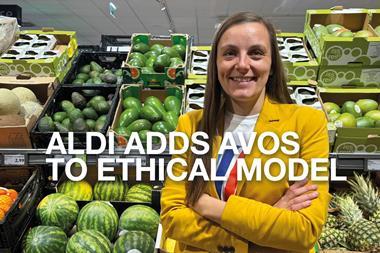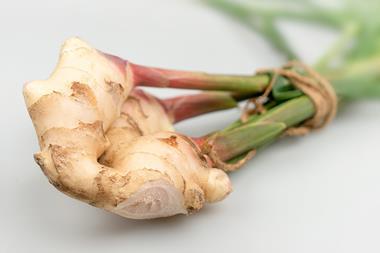
Having risen from relative obscurity to become one of the biggest and most admired operators in the business in the 30 years since the Olins family took over, Poupart knows a thing or two about evolving with the times.
(Scroll down for video)
The group has faced a number of challenges of its own in recent years, particularly with customers shaking up their supply arrangements in the citrus and top-fruit sectors, but it has now undergone a restructure and rebrand that it believes leaves it fit for a new era of growth.
As a group, Poupart came in at number two in the FPJ Big 50 Companies 2016, with a £389 million turnover just behind leader Total Produce, and with further growth anticipated it could stake a claim to be number one when the new rankings are released in December.
One of the most significant changes was to establish BerryWorld as a standalone business, with the other companies within the group – OrchardWorld, Citrus First, Poupart Imports and Norton Folgate – coming under the new umbrella of Poupart Produce. With a management team of David Gray, Mark Culley, Matt Hancock, Jonathan Olins, Robin Dawson and Gavin Gill, Poupart Produce has ambitions to boost sales from around £120m this year to almost £160m by 2020.
The new, more integrated structure has enabled Poupart Produce to make a number of cost savings by centralising various head office functions. The move also extends into certain key personnel, with Gill, for example, being installed as group technical manager.
Whereas previously the various Poupart companies worked more in silos, supplying individual products to the market, now it aims to combine the expertise of all the divisions. “Poupart Produce is about working more closely together,” explains Culley. “Customers can therefore trade with us however they want to do it. It’s a case of multiple products to both a new and existing customer base.”
The idea is that it has a more fluid structure in which customers can trade with either Poupart Produce or the individual companies, as well as giving existing suppliers the chance to sell to customers who would generally not be available to them. For clients, there is the opportunity to deal with a single account manager for all of their sourcing needs.
The new structure comes after a tough couple of years for the business. OrchardWorld lost a £38m Sainsbury’s contract, Poupart Citrus was the victim of Waitrose’s linkup with Primafruit, and Norton Folgate lost its cherry supply business with Tesco.
That succession of events would have brought many companies to their knees, but in adversity comes opportunity and a raft of new customers means a more diverse range of clients for the business. OrchardWorld now has a significant top-fruit business with Aldi, while Norton Folgate has a burgeoning cherry business with Sainsbury’s and Waitrose and expects to have replaced all of the lost Tesco volumes by the end of this year.
As a group of companies, Poupart Produce’s key customers include Ocado and FreshDirect, while customers of the individual business units include Aldi, Costco, The Co-operative, Sainsbury’s, Waitrose and Whole Foods Market.
With Aldi now such a major customer, and on an apparently relentless expansion drive, it’s understandable that Culley is full of praise for the discounter. “It’s another world [supplying discounters] and a massive mindset change,” he says. “You can’t supply a discounter in the same way as a big-four store. It’s very positive. Big supermarkets have complicated everything so much.”
The exponential rise in dotcom grocery is also providing scope for opportunity, and Poupart is exploring avenues in the online marketplace. With Ocado growing at 15 per cent a year and Poupart’s business exceeding that with top fruit, citrus and stonefruit, the firm has invested in a specific dotcom account manager.
For Hancock, the opportunity to supply a wider range of customers is refreshing. “From a customer perspective, bigamy is now back on the menu,” he says. “It’s not a dirty word.” You also get the sense that, while Poupart might not necessarily have chosen to go through the stress of changing many of its biggest customers, it is feeling refreshed by a new, largely non-big four client base who are on the up, rather than dealing with the well-documented travails of the largest retailers.
The strong-performing Poupart Imports division, which supplies a full range of fruit and salads, has encapsulated the benefits of having a broad customer base. With over 130 clients across everything from wholesalers and processors to independent retailers, cruise ships and airlines, the business, which makes up 46 per cent of Poupart Produce’s turnover, is matching the 10 per cent growth seen in the sector.
“The difference with our business is that we are in the spot market and we don’t have any fixed orders or programmes,” explains Olins, who runs the company. “We’ve built our business on exclusive brands from around the world. Ninety per cent of our growers are supplying the supermarkets but have lost their brand identity in plain green or brown boxes. They are proud of them, and we have these brands, and we are also linking up with new growers are who giving us exclusivity.”
As the largest non-supermarket supplier in the UK, Olins sees real opportunity for further progression for Poupart Imports, particularly with the rise of street eating and a burgeoning restaurant market. Its office in Spain also means it has its feet on the ground in one of the world’s key production nations.
This certainly feels like the dawn of a new era for Poupart. Culley describes the group as “well financed”, giving it a cushion for dealing with the inevitable vagaries of the market. Hancock, meanwhile, puts it more poetically, likening the new, stripped-back and simplified structure as “the EasyJet of the industry”. “For too long in this industry we’ve made things too complicated,” he adds. “I think we should lead that change.”
And with Poupart’s reputation for moving with the times already well established, few would bet against it making a success of its new structure either.









